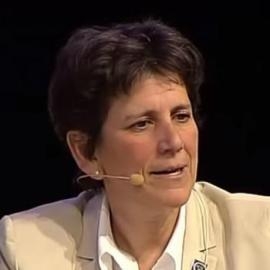Fish & Chips: Tracking Tunas and Sharks in our Blue Serengeti, Dr. Barbara Block
–
Online
Free
Open to the Public

The Earth’s oceans cover the majority of the surface area of our planet, yet our understanding of the marine ecosystem is limited. Dr. Block presents her (rock-star level, pioneering) work studying tunas and sharks across our global oceans, enabling proactive fisheries management and conservation.
Fish & Chips: Tracking Tunas and Sharks in our Blue Serengeti
Lecture and Discussion
Speaker: Dr. Barbara Block, Protho Professor of Marine Sciences, Stanford University Hopkins Marine Station
Tuesday, November 10, 2020
6:00pm to 7:00pm Pacific Time
Online via Zoom (details below)
About the Topic
Dr. Block will focus onbiologging science, the use of small electronic tags attached to free-swimming fish, to log and transmit data about movements and behaviors in the open sea. These data provide a novel ability to track fish and sharks in remarkable detail swimming throughout our ocean ecosystems, providing global data sets on ocean habitat use in both the horizontal and vertical domains. These detailed scientific data on the movements of multiple species across our global oceans enable proactive fisheries management and conservation. Dr. Block’s lab, the Tuna Research and Conservation Center, combines the movement ecology with physiology and genomics to better understand the specializations and population structure of highly migratory fish. The Center tries to combine our science based approaches with policy to improve the outcomes for fish and shark biodiversity and often engage with fishery managers to improve management outcomes for these species.
About the Speaker
Dr. Barbara A. Block holds the Charles and Elizabeth Protho Professorship at Stanford University. Her research is focused on how large pelagic fish utilize the open ocean. She and her team have pioneered the successful development and deployment of electronic tags on tunas, billfishes and sharks that enable following these highly migratory fish in the oceans. Dr. Block is co-founder with the Monterey Bay Aquarium of the Tuna Research and Conservation Center the only facility in North America holding tunas for research. The lab studies bluefin and yellowfin tunas from a whole organism to genome perspective with interests in physiology of migrations, thermogenesis, cardiac biology, energetics and reproduction. The combination of lab and field research has led to a rapid increase in the understanding of movement patterns, population structure, physiology and behaviors of pelagic fish and sharks as they move across the planet. Block and her tuna team have deployed thousands of electronic tags on tunas (bluefin, yellowfin and albacore) in the Atlantic and Pacific oceans, and performed genetic and isotopic analyses that provide insight about physiology, migrations, population structure, ecology and management models for tunas’ in the Atlantic and Pacific oceans. Block was a co-chief scientist for the Tagging of Pacific Predators program (TOPP), organized under the Census of Marine Life. This international program, the largest electronic tagging program on the globe, succeeded in placing 4,000 electronic tags on 23 predators in the California Current to better understand how pelagic animals (tunas, sharks, sea turtles seabirds, seals and whales) use the North Pacific ecosystem.
She earned her B.A. at the University of Vermont, and began her oceanographic career at Woods Hole Oceanographic Institution in 1979 with Dr. Francis G. Carey. She earned her Ph.D. in 1986 at Duke University and a postdoc at the U. Pennsylvania. She was an assistant professor at the University of Chicago (1989-1993) and joined the Stanford faculty in 1994. Block and her team have published hundreds peer reviewed papers, and has received numerous awards including: the NSF Presidential Young Investigator Award, a, Presidents Medal, Society for Experimental Biology in London, a MacArthur Fellowship, a Pew Fellowship for Marine conservation, the Walter Cannon Award from the American Physiological Society, and a Rolex Award for Enterprise. She is the 2016 recipient of the Benchley Award in Ocean Conservation.
Block founded the TAG A Giant Foundation to elevate the science and conservation initiatives for bluefin tuna globally in 2006. She is committed to science communication and has helped by establishing with the Monterey Bay Aquarium the Open Ocean exhibit in 1994 and numerous science museum exhibits on ocean science. Block has directed, written and collaborated on a number of films, including Discovery’s Blue Serengeti.
Lecture Location: Online via Zoom
Title: Class #IEPG 8666A: Intl. Marine Policy Speaker Series
Join from PC, Mac, Linux, iOS or Android: https://middlebury.zoom.us/j/95604840118?pwd=TkdXeUJUclhUQzJjZGo5dG8yM09WZz09
Password Required: 9r026v
Or iPhone one-tap :
US: +16468769923„95604840118# or +13017158592„95604840118#
Or Telephone:
Dial(for higher quality, dial a number based on your current location):
US: +1 646 876 9923 or +1 301 715 8592 or +1 312 626 6799 or +1 669 900 6833 or +1 253 215 8782 or +1 346 248 7799
Meeting ID: 956 0484 0118
Password for Phone only: 326551
International numbers available: https://middlebury.zoom.us/u/alKvKS5G
Please note: This lecture will be recorded, but only for internal use by students and faculty at the Middlebury Institute. It will not be posted publicly.
Questions
The Center for the Blue Economy is a research organization at the Middlebury Institute of International Studies. Our mission is to promote a sustainable ocean and coastal economy (the “Blue Economy”) through leadership in research, analysis, and education. For questions contact: Rachel C. at cbe@miis.edu or visit centerfortheblueeconomy.org or call 831-647-4183 (must leave message and receive call back).
